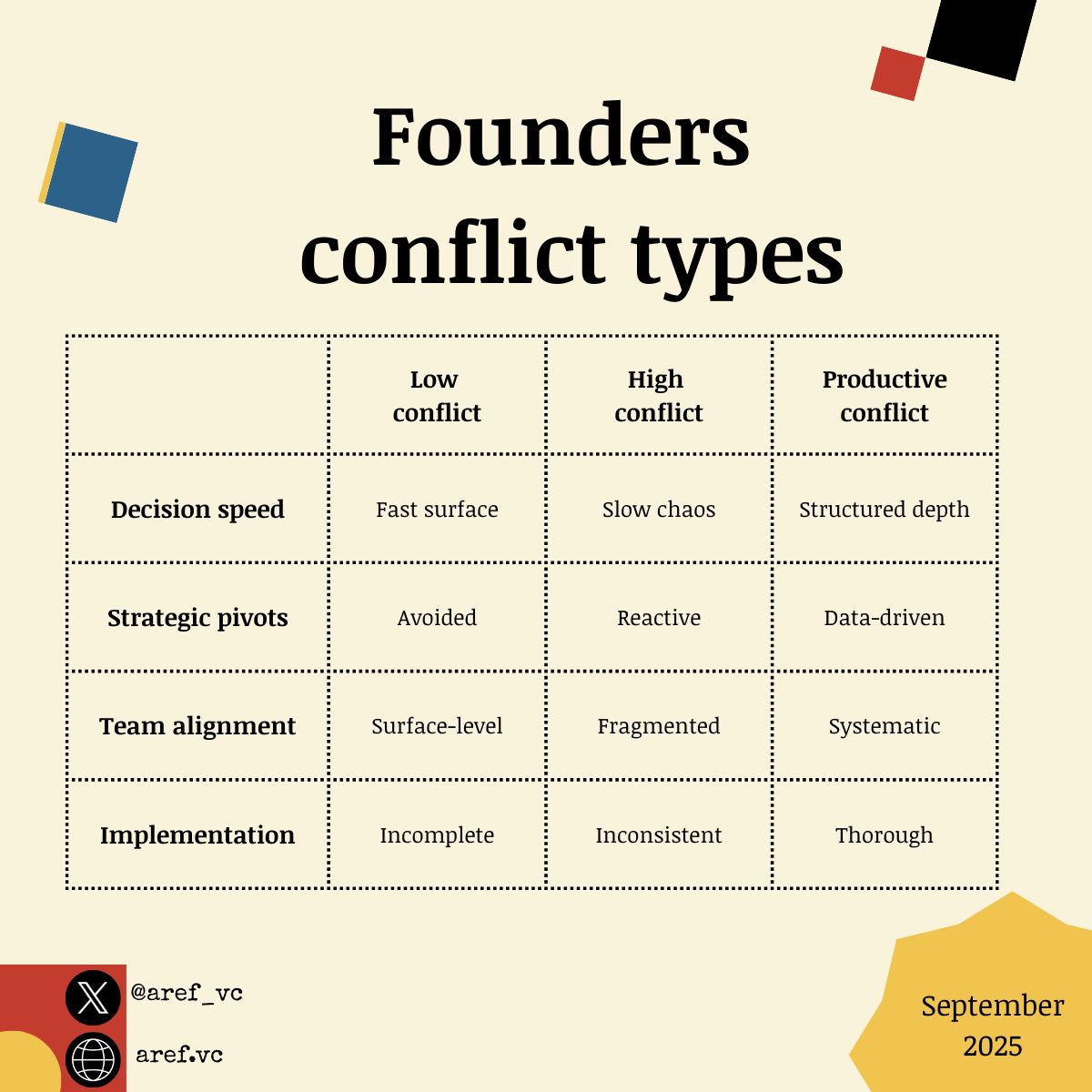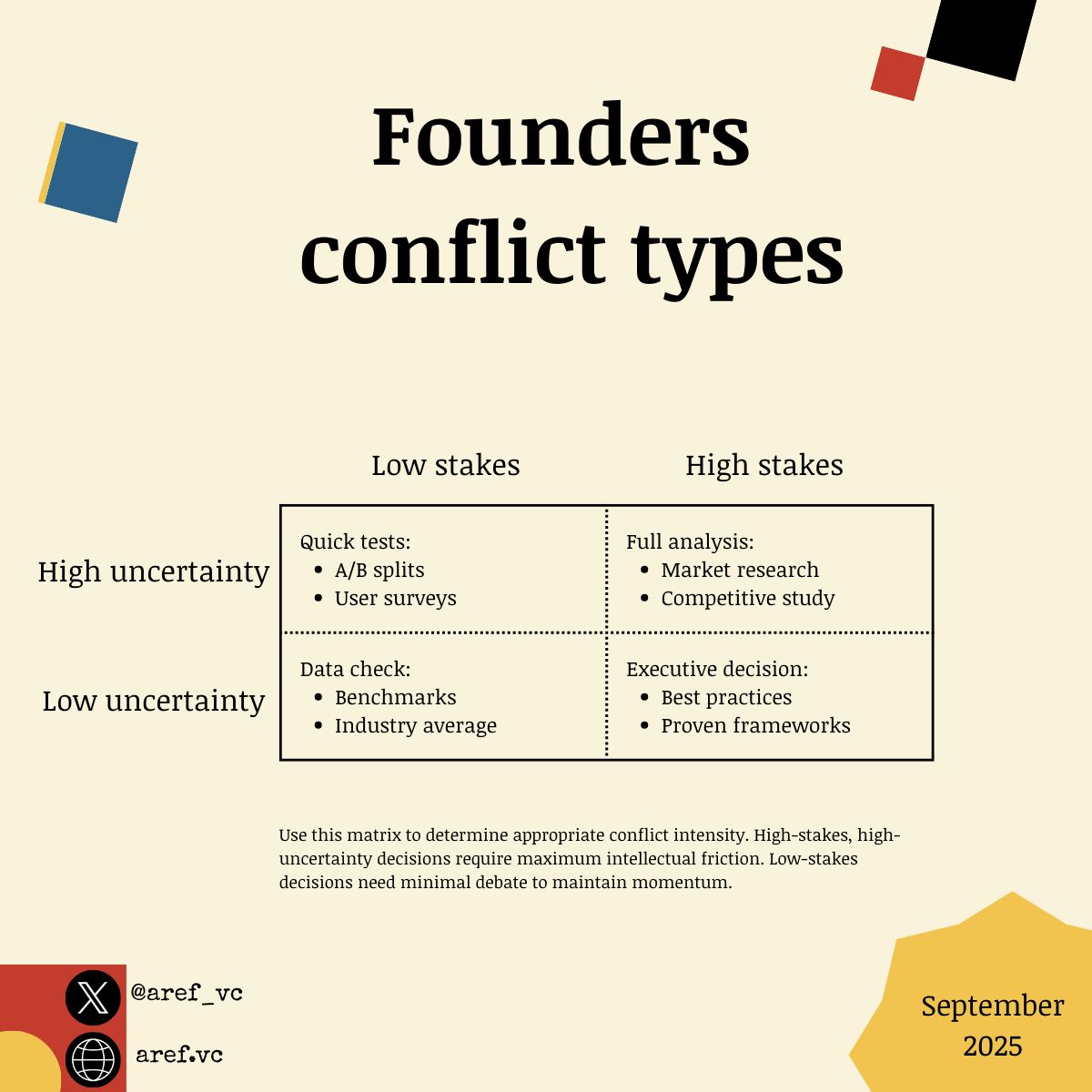65% of startups fail due to founder conflict, according to Harvard Business School research on entrepreneurial team dynamics [Source: Harvard Business School, "The Founder's Dilemma" study].
Having been through multiple conflict phases, the pattern is consistently observable: teams that fight productively about strategy significantly outperform teams that avoid conflict in key operational metrics. The difference is structured intellectual friction.
The false consensus trap
Most founding teams mistake agreement speed for decision quality. Quick consensus often signals someone isn't thinking critically or worse, someone isn't sharing real concerns about execution risks.
When Loudcloud transformed into Opsware in 2002, the transition required fundamental strategic decisions under extreme pressure. The company's stock had crashed from IPO levels to $0.35 per share during the dot-com collapse [Source: VentureBeat, "Opsware sells to HP for $1.6 billion"]. The eventual $1.6 billion acquisition by HP in 2007 validated their conflict-driven strategic pivots.
Observable patterns across scaling companies suggest that teams prioritizing relationship comfort over strategic clarity consistently struggle with product-market fit recognition compared to teams with structured disagreement protocols.
The operational cost of avoiding conflict
The data reveals a counterintuitive pattern: moderate conflict with clear resolution frameworks produces the fastest high-quality decisions. Low conflict creates hidden strategic debt. High conflict without structure destroys execution velocity.

Framework for productive disagreement
Based on operational patterns across successful scaling companies, productive conflict requires three systematic components:
1. Outcome optimization over position defense
Rule: Every argument must focus on business outcomes, not personal validation. When LinkedIn's founding team spent six months debating user payment models versus employer payment models, both sides presented data on customer acquisition costs and lifetime value rather than defending preferences [Source: LinkedIn business model evolution analysis].
2. Idea-identity separation protocols
Rule: Attack strategies without attacking competence. Challenge reasoning without questioning intentions. This means using specific phrases: "The data suggests X approach might limit growth" instead of "You don't understand the market."
3. Conflict-strengthened relationship agreements
Rule: Establish explicit understanding that disagreement strengthens rather than threatens partnerships. Document this agreement and reference it during heated debates.
The intellectual resistance testing framework
Use this matrix to determine appropriate conflict intensity. High-stakes, high-uncertainty decisions require maximum intellectual friction. Low-stakes decisions need minimal debate to maintain momentum.

The most dangerous operational pattern: making high-stakes decisions without sufficient intellectual resistance to test reasoning quality.
Implementation tactics that work
Questions that transform destructive conflict into strategic insight:
"What would have to be true for your position to be optimal?"
"What data would change your mind about this approach?"
"Where might both positions be partially correct?"
"What execution risks are we missing while focused on this disagreement?"
These questions shift focus from winning arguments to discovering better solutions.
Conflict timing and strategic leverage
The timing of productive conflict creates compound advantages. Early-stage disagreements about market positioning prevent costly pivots later. Mid-stage conflicts about scaling approaches prevent operational debt accumulation.
Based on operational experience across multiple scaling phases, teams that resolve fundamental strategic conflicts within the first 18 months consistently outperform teams that defer difficult decisions in subsequent revenue growth phases.
However, this data reflects survivorship bias—failed companies with unresolved conflicts aren't tracked in long-term studies. The actual impact may be higher since conflict resolution affects company survival rates.
The contrarian insight about founder relationships
Traditional advice suggests founders should be compatible and agreeable. Operational reality shows the opposite: founders with complementary conflict styles and mutual respect for disagreement build more resilient companies.
Marc Andreessen and Ben Horowitz's partnership exemplifies this principle. After navigating Loudcloud's transformation to Opsware through multiple strategic pivots, they co-founded Andreessen Horowitz, one of Silicon Valley's most successful venture capital firms [Source: Andreessen Horowitz founding history]. Their ability to disagree productively became a competitive advantage in evaluating investments.
Key takeaways:
65% of startup failures stem from founder conflict, making this an execution-critical skill
Teams with structured disagreement protocols consistently outperform conflict-avoidant teams in operational metrics
Productive conflict requires outcome focus, idea-identity separation, and explicit relationship agreements
High-stakes decisions need maximum intellectual resistance; low-stakes decisions need minimal debate for momentum
For operators building companies: create systematic space for necessary intellectual friction. Your strategic decisions are only as good as the quality of disagreement they survive.
The companies that make optimal decisions aren't led by the smartest individuals: they're led by teams that fight intelligently about what matters most.
